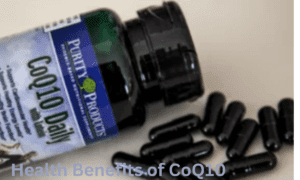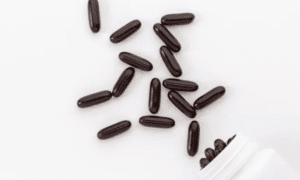Health Benefits of CoQ10

Health Benefits of CoQ10: Multiple clinical investigations indicate that CoQ10 supplements have the potential to alleviate leg edema, decrease fluid accumulation in the lungs, hence facilitating easier breathing, and enhance exercise capacity in individuals suffering from heart failure.
However, not all research has yielded beneficial results, and certain investigations have revealed no discernible impact. Consequently, the utilization of CoQ10 for heart failure remains a subject of controversy.
Health Benefits of CoQ10
The human body makes its own coenzyme Q10, commonly known as CoQ10. Taking CoQ10 supplements may alleviate the symptoms of several medical issues.
Enzyme coenzyme Q10, or CoQ10, aids in cellular energy production. It can also enhance immunity and shield cells from harm by acting as a potent antioxidant.12 Vitamin Q10 and ubiquinone are additional names for CoQ10.
In most cases, your body creates more than enough coenzyme Q10. However, your levels can drop if you suffer from neurological illnesses, fibromyalgia, or cardiovascular disease. Your levels of CoQ10 may drop if you use statins or other drugs that lower cholesterol.
Raising your CoQ10 levels may be recommended by your healthcare providers. Taking a CoQ10 supplement is one approach to this. There is little evidence that taking a CoQ10 supplement harms your health.
Supplements for your diet are only sometimes safe because the Food and Drug Administration regulates them rather loosely. Supplement effects are quite individual and dependent on factors such as supplement kind, dosage, frequency of usage, and drug interactions. It is important to consult your doctor or pharmacist before beginning any new supplement regimen.
Health Benefits of Chia Seeds: A Promising Tool for the Treatment of Metabolic Diseases
Reasons to Use CoQ10



A CoQ10 supplement may not be necessary for everyone, particularly those who maintain a healthy weight, exercise regularly, and do not suffer from any preexisting diseases. However, there are situations in which taking one could be helpful. Research shows promise in addressing several health concerns.
1. Possible to Promote Better Heart Health
Taking CoQ10 may improve heart function, according to some research. This may be especially true for people with heart failure.
When added to conventional treatment for heart failure, 100 mg of CoQ10 taken three times daily for two years reduced the chance of death from heart problems and improved symptoms in 420 patients compared to a placebo.
Another inflammatory sign that may indicate your risk of cardiovascular disease is high-sensitivity C-reactive protein; CoQ10 may be able to lower this level as well.
One study found that high-sensitivity C-reactive protein levels decreased in patients with cardiovascular disease who took a CoQ10 supplement for 12 weeks. The dosage for the supplement was 175 milligrams daily, with a range of 30 to 300 milligrams.6
Additionally, research has demonstrated that CoQ10 can mitigate the potential cardiac side effects of doxorubicin and other chemotherapy medicines.
2. Maybe Statins Will Lessen Muscle Pain
Medications like statins, which decrease cholesterol, can cause muscle soreness and cramps in some people. Scientists think statins can lead to low levels of CoQ10, which could explain this pain.
In a single pilot study, researchers examined whether taking 50 milligrams of coenzyme Q10 twice daily could lessen the medication’s side effects. The pill alleviated moderate to mild muscle pain, according to the research. Another finding was that there should be less restriction on participants’ ability to go about their everyday lives.
Vitamin B12 Deficiency or Folate Deficiency Anemia
3. Maybe Lessen the Impact of Headaches
According to a meta-analysis of six trials, migraine sufferers reported less pain after three months of taking a CoQ10 supplement. The duration of their headache attacks decreased, but the intensity of their migraines persisted. Also, compared to those who received a placebo, they reported fewer headaches.
4. Probable to Alleviate Fibromyalgia Symptoms
A wide range of symptoms, including widespread pain, extreme exhaustion, and disturbed sleep patterns, characterize fibromyalgia. Coenzyme Q10 may help fibromyalgia sufferers deal with pain, fatigue, and morning drowsiness. Taking supplements may help with more than just the disease itself; it may also alleviate anxiety and despair.
A study indicated that CoQ10 can greatly enhance most pain-related outcomes, ranging from 24% to 37%. People with fibromyalgia may find that this decrease in pain enhances their everyday functioning and quality of life.
5. Could Potentially Resolve Erectile Dysfunction



When a man has trouble achieving and maintaining an erection, this is known as erectile dysfunction. Coenzyme Q10 (CoQ10) supplements may aid erectile dysfunction (ED), according to 230-person research.
High blood pressure, the most prevalent comorbidity with erectile dysfunction, was also present in all of the study subjects.
In addition to their hypertension medication, everyone took 200g of CoQ10 daily for three months. In the group of males with mild erectile dysfunction, 20.1% reported a complete resolution of their symptoms. This was not the case for those whose ED was moderate to severe.
Odds of oxidative stress in erectile dysfunction have been found. Due to its ability to prevent oxidative damage, researchers think CoQ10 may benefit erectile dysfunction.
6. Could Potentially Assist with Diabetes Management
One of the most critical aspects of preventing and controlling diabetes is maintaining stable insulin and blood sugar levels. CoQ10 may be useful in maintaining healthy levels.
According to a meta-analysis of forty trials, Coenzyme Q10 decreased fasting glucose and insulin levels. It also reduced the average blood sugar level over the past three months, known as HbA1C.
In all the investigations, the daily dosages varied between 100 mg and 900 mg. People took the supplement for four to six months.
Researchers have shown that coenzyme Q10 (CoQ10) helps persons with type 2 diabetes manage their blood sugar and cholesterol levels.
There has been conflicting evidence on the efficacy of CoQ10 in treating diabetes. The majority of research suggests that there is no statistically meaningful reduction in glucose and HbA1C levels. However, studies showing the supplement’s impact on insulin have shown more encouraging results.
Consumption of dietary sources is another way to acquire CoQ10, in addition to its production by the body itself. The value of coenzyme Q10 is 1516.
- Meat, particularly chicken legs, and hearts
- Fish, particularly trout and herring
- Fruits, nut
- A few different oils
- Grains, especially wheat and rye
- Peas, broccoli, cauliflower, and spinach
- Apples, strawberries, oranges, and other citrus fruits
A Guide to Taking CoQ10


To supplement your diet with CoQ10, you can choose from various tablets, capsules, soft gel, or liquid forms. Formulations ranging from 30 mg to 600 mg are available. Although there is a lack of data on this type of application, topical over-the-counter formulations are also accessible.
To maximize absorption, take CoQ10 with a meal that contains oil or fat since it is a fat-soluble vitamin.
1. Recommended Dosage
The optimal amount of CoQ10 has yet to be determined.
Coenzyme Q10 dosages of 60 mg to 1,000 mg daily for as long as 12 weeks are common. You can lessen the likelihood of adverse effects by spreading your dose throughout the day if you take more than 100 mg.
The underlying condition you are attempting to treat may determine the dosage. For example, 100 mg to 400 mg daily dosages have been utilized in investigations about the heart. The treatment of neurodegenerative illnesses has made use of dosages ranging from 600 mg to 3,000 mg.
2. What About The Safety of Coenzyme Q10?
CoQ10 has a generally positive safety profile in adults. Because there is less research on these populations, talking to a doctor before taking the supplement is important. However, it may also be safe for pregnant women and children (at lower dosages). The safety of CoQ10 for nursing mothers is unclear.
Despite lacking an official endorsement from the FDA, CoQ10 is widely available and highly recommended for various health conditions.
3. Possible Inhibitors of Drug Action
There is some evidence that CoQ10 may reduce the efficacy of certain medications due to drug interactions. This is why, before beginning any new program, you should inform your doctor of all the drugs and supplements you are already taking.
4. The Following Drugs are Less Effective When Taken With CoQ10:19.
- The blood-thinning medicine warfarin, marketed under the brand names Coumadin and Jantoven, and the diabetic medicine Insulin
- Certain medications for cancer
- CoQ10 may amplify the impact of blood pressure drugs. Using both at once may lead to a dangerously low blood pressure reading.
5. Things to Keep in Mind
- Supplements are not subject to the same level of regulation by the FDA as pharmaceuticals. Regarding their safety and efficacy, the FDA has zero say in the matter.
- Because of this, you should only buy supplements that have passed rigorous third-party testing. ConsumerLab, NSF International, and the United States Pharmacopeia are among the most prominent groups.
- Supplements may pass muster with these organizations regarding quality control and ingredient accuracy. You may need to be safe and effective.
- A healthcare provider should still be consulted before using them.
- Also, if you suffer from allergies, be sure it doesn’t include any common allergens. Asthma and immunology: People suffering from asthma and allergies should read the label carefully. They argue that products labelled as “natural” are not necessarily safe.
6. How Much CoQ10 Is Too Much?


Although taking an excessive amount of any supplement is conceivable, even at large doses, CoQ10 is generally well-tolerated. According to the available research, there is little evidence of harm, even at doses as high as 1,200 mg/day. It should be noted that the majority of research has utilized standard daily dosages ranging from 100 mg to 200 mg.4
Cooking Fish: A Mouthwatering Recipe
7. Concerns Regarding CoQ10
According to the research, when taken as directed, CoQ10 is safe. Nobody has explained any major adverse consequences. However, you could have side effects, including trouble sleeping or gastrointestinal problems like an upset stomach, vomiting, diarrhea, or nausea.
Insomnia was a side effect for those using 100 mg or more of CoQ10 daily for migraines, according to one study. People using 300 mg or more daily had increased liver enzymes, although no liver damage was reported in another research.
8. Among the Less Common Potential Adverse Effects Are:
- Feeling lightheaded
- Light sensitivity
- Discomfort in the head
- Stomach Acid
- Feeling exhausted
An Overview
Coenzyme Q10, or CoQ10, is an enzyme that plays a crucial role in helping cells produce energy. Additionally, it protects cells from harm by acting as a potent antioxidant. You can get CoQ10 in supplement form, but your body makes it naturally.
Some chronic disorders may be preventable or treatable with CoQ10 supplements. In particular, coenzyme Q10 has shown promise in several areas, including cardiovascular health, blood sugar regulation, and migraine headache frequency.
It is recommended that you consult with a healthcare provider or a trained dietician before contemplating taking CoQ10. In addition to helping you determine the optimal dosage, they can tell you whether the supplement may interact negatively with anything else you’re taking.
In writing this blog post, I aimed to provide you with more information about different social issues. Feel free to ask anything by posting a comment down below. Visit and subscribe to blogkingworld.com. Thanks




